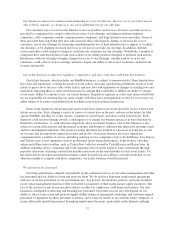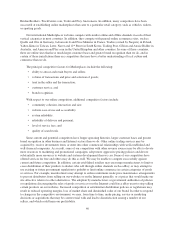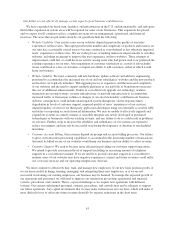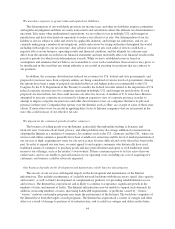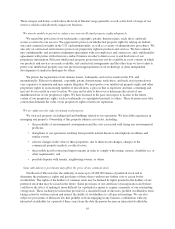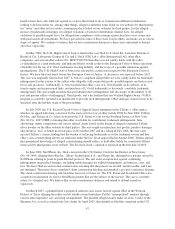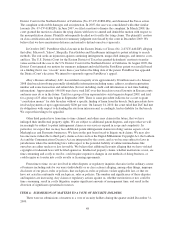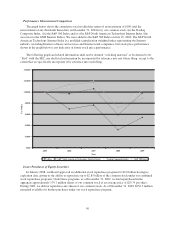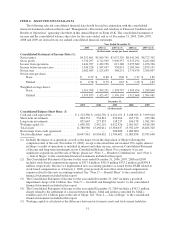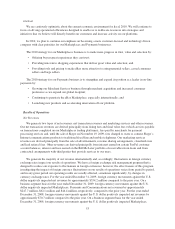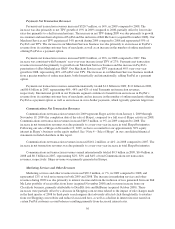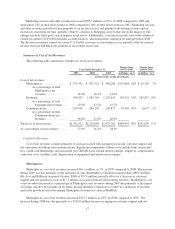eBay 2009 Annual Report Download - page 55
Download and view the complete annual report
Please find page 55 of the 2009 eBay annual report below. You can navigate through the pages in the report by either clicking on the pages listed below, or by using the keyword search tool below to find specific information within the annual report.brand owners have also filed suit against us or have threatened to do so in numerous different jurisdictions,
seeking to hold us liable for, among other things, alleged counterfeit items listed on our websites by third parties,
for “tester” and other not for resale consumer products listed on our websites by third parties, for the alleged
misuse of trademarks in listings, for alleged violations of selective distribution channel laws, for alleged
violations of parallel import laws, for alleged non-compliance with consumer protection laws or in connection
with paid search advertisements. We have prevailed in some of these suits, lost in others, and many are in various
stages of appeal. We continue to believe that we have meritorious defenses to these suits and intend to defend
ourselves vigorously.
In May 2009, the U.K. High Court of Justice ruled in the case filed by L’Oréal SA, Lancôme Parfums et
Beauté & Cie, Laboratoire Garnier & Cie and L’Oréal (UK) Ltd v. eBay International AG, other eBay
companies, and several eBay sellers (No. HC07CO1978) that eBay was not jointly liable with the seller
co-defendants as a joint tortfeasor, and indicated that it would certify to the European Court of Justice questions
of liability for the use of L’Oreal trademarks, hosting liability, and the scope of a possible injunction against
intermediaries. The U.K. High Court of Justice has released its certification request to the European Court of
Justice. We have filed our briefs before the European Court of Justice. A decision is not expected before 2011.
The case was originally filed in July 2007. L’Oréal’s complaint alleged that we were jointly liable for trademark
infringement for the actions of the sellers who allegedly sold counterfeit goods, parallel imports and testers (not
for re-sale products). Additionally, L’Oréal claimed that eBay’s use of L’Oréal brands on its website, in its
search engine and in sponsored links, and purchase of L’Oréal trademarks as keywords, constitute trademark
infringement. The suit sought an injunction preventing future infringement, full disclosure of the identity of all
past and present sellers of infringing L’Oréal goods, and a declaration that our Verified Rights Owner (VeRO)
program as currently operated was insufficient to prevent such infringement. Other damages claimed were to be
specified after the liability stage of the proceedings.
In July 2009, the U.S. Second Circuit Court of Appeals heard arguments in the Tiffany v. eBay matter
which is on appeal following a decision by the trial court in favor of eBay in July 2008. In June 2004, Tiffany
(NJ) Inc. and Tiffany & Co. filed a lawsuit in the U.S. District Court for the Southern District of New York
(No. 04 Civ. 4607 (NRB)) claiming that eBay was liable for contributory trademark infringement, false
advertising, unfair competition and various related claims based on the listing of alleged counterfeit Tiffany
silver jewelry on the eBay website by third parties. The suit sought an injunction, lost profits, punitive damages
and attorneys’ fees. A bench trial took place in November 2007 and in a ruling in July 2008, the trial court
rejected Tiffany’s claims, finding that the burden of enforcing trademarks is on the trademark owner and that
eBay’s anti-counterfeiting efforts are sufficient under the law. In an appeal filed in August 2008, Tiffany argued
that generalized knowledge of alleged counterfeiting should suffice to hold eBay liable for counterfeit Tiffany
items sold by third parties on its website. The Second Circuit’s opinion is expected in the first half of 2010.
In June 2006, Net2Phone, Inc. filed a lawsuit in the U.S. District Court for the District of New Jersey
(No. 06-2469) alleging that eBay Inc., Skype Technologies S.A., and Skype Inc. infringed five patents owned by
Net2Phone relating to point-to-point Internet protocol. The suit seeks an injunction against continuing
infringement, unspecified damages, including treble damages for willful infringement, and interest, costs, and
fees. We have filed an answer and counterclaims asserting that the patents are invalid, unenforceable, and were
not infringed. The parties have completed claim construction briefing and attended a pre-trial conference hearing.
The claim construction hearing and trial dates have not yet been set. The U.S. Patent and Trademark Office has
accepted reexamination on all five Net2Phone patents that are the subject of the lawsuit. The case is currently
subject to a limited stay. We believe that we have meritorious defenses and intend to defend ourselves
vigorously.
In March 2007, a plaintiff filed a purported antitrust class action lawsuit against eBay in the Western
District of Texas alleging that eBay and its wholly owned subsidiary PayPal “monopolized” markets through
various anticompetitive acts and tying arrangements. The plaintiff alleged claims under sections 1 and 2 of the
Sherman Act, as well as related state law claims. In April 2007, the plaintiff re-filed the complaint in the U.S.
47


